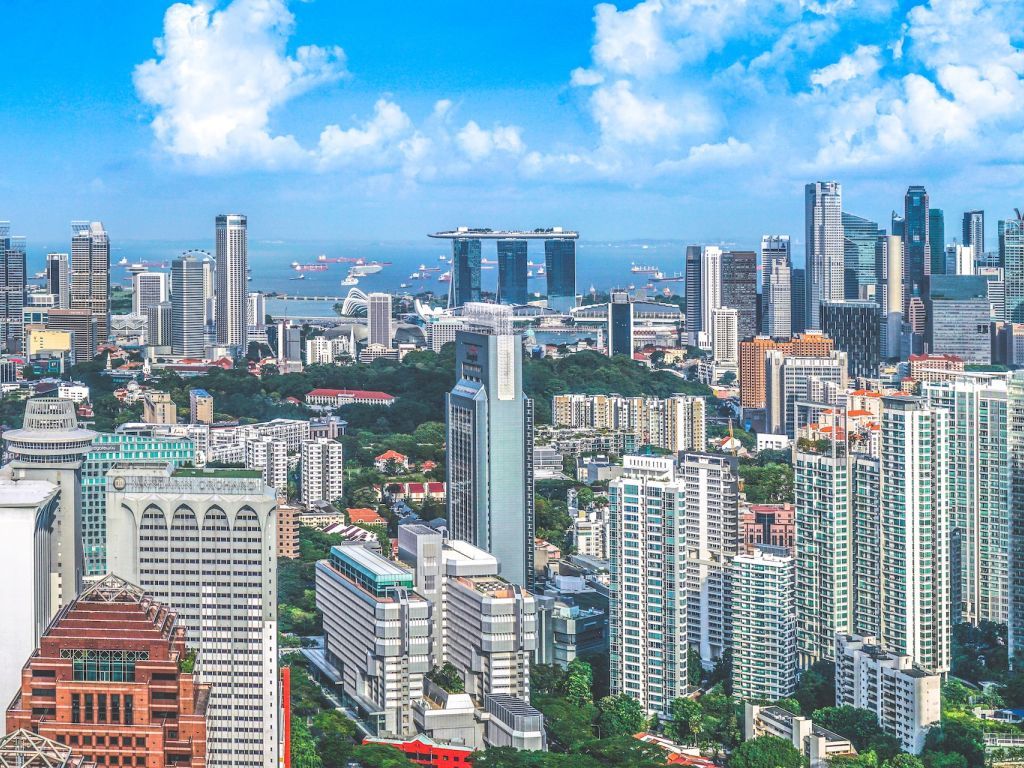Konstantin Popovic, a Serb in Singapore – He Created Campaigns for World’s Most Famous Companies, Now He Advises Them About Sustainability, and He Also Has a Message for Serbian Companies
(Photo: Bob Ghost/Unsplash)

“Ad Exec Konstantin Popovic Launches Singapore Sustainability Consultancy” – in was this article, published on Asia’s most famous environmental news website Eco Business, that led us to this man with a rich biography.
He agreed to do an interview for the Cirkularna Ekonomija portal immediately, not hiding that he was delighted to be able to speak for a medium from his country of origin. We talked about life in Singapore, which sometimes seems to him like a country of the future, the reasons why he left his advertising job, greenwashing and the responsibility of large corporations.
Popovic explained to us that his Serbian was bad, as he had grown up in Germany. He didn’t hide that all that moving that followed throughout the years and the fact that his parents still lived in Berlin had contributed to his losing contact with Serbia.
– Still, in the past six months, as I’ve begun my new career path, I am somehow magically reconnecting with Serbia. First, in Singapore, I met a Serbian colleague who is also active in this field, and then I found a website designer in Novi Sad, my city of birth, and now I am honored to talk to you for cirkularnaekonomija.org – says this former advertising director, and now a sustainability consultant.
And how did it all begin? Summing up his career, our interviewee recalls that, toward the end of his international business studies, he decided to try his hand at advertising, at the BBDO agency, because he liked the creativity and the variety of the people he worked with. The fast development of internet companies enabled him to move to Chicago in 1999, and later to New York.
– I had spent 16 years in the USA, which meant that I become an American of sorts. I loved New York so much that I never even thought that Asia could be our next destination. But then an excellent opportunity presented itself at the Grey agency in Singapore, so I moved with my wife halfway across the world. In the past eight years, we have been here in Southeast Asia, and before launching a private business, I was a director at the Grey agency in Singapore – Popovic tells us.
After three decades in advertising, you founded the company Impact3P in Singapore, which offers consulting services in the fields of sustainability, carbon calculations, ESG reporting. Why did you decide to leave an ad agency and found a sustainability company?
– It would be untrue to say that I’ve always wanted to be active in this field. At the time of the Paris Agreement, I was somewhat uninformed. The first trigger occurred when we were hired to do a series of ads for the Singaporean Ministry of Sustainability and Living Environment at the end of 2019. One of the tasks was to create a campaign for raising awareness of the climate crisis. I started studying the subject at the time, but the true waking call happened when I joined Al Gore’s organization Climate Reality Project. That’s when, at our agency, I created the Sustainable Grey sector, which was at the same time an internal movement and a service for clients. Last year, I celebrated 30 years in advertising, so it was the right moment to start a new journey, following my passion. In a way, Impact3P is the first version of what I want to do for the next 30 years – to make an impact on the world.
When it comes to sustainability, as consumers, we expect the most from the corporations which have the biggest impact on the environment. During your marketing career, you cooperated with numerous big companies. What is your impression – are those companies ready to make substantial changes in the way they operate in order to protect the environment, or are they focusing only on marketing, even if it’s false?
– At the risk of generalizing, I see three types of approach. The first group consists of companies which spend considerable amounts of money on sustainable marketing, PR, lobbying. The more they spend, the more suspicious we should be. Luckily, a critical look when it comes to greenwashing is at a high level, especially in Europe. The second type of large multinational companies understands that sustainability is an operating transformation which first deals with the supply chain and the production, and only then with marketing. The third group consists of companies which produce consumer goods and which work on operating solutions, inciting the consumers as well to deal with the issue. This is an important job, because marketing has the power to influence a change in behavior. For example, P&G has done a pretty good job when it comes to diversity and inclusion in the USA.
When a big beverage manufacturer advertises its plastic bottles as fully recyclable even though it knows that they won’t be recycled, at least not in all markets, due to the lack of infrastructure, or when a fashion company invites consumers to bring their clothes over to be recycled, even though the data show that, in practice, a very small percentage of textile waste is truly recycled, are those examples of good or bad practices and communication in the field of sustainability?
– Unfortunately, only 9% of the total amount of plastic is recycled. The reality is that very few countries have realized considerable progress in the recycling infrastructure and in the subsequent changing of consumer habits. So, the claim about recyclable plastic bottles only makes sense in those countries. On the other hand, the fashion industry first needs to solve the issue of human rights in its supply chain: modern slavery, unjust wages, exposure to toxic materials – in my opinion, those are the fields in which “cleaning” needs to be stepped up. It’s shocking, but it seems that nobody cares about it, as proven by the incredible success of the company Shein.
Singapore – a country of the future (Photo: Mike Enerio/Unsplash)

Can companies have everything, make profit and honor the environment and the limited natural resources?
– I deeply believe that companies should view sustainability through the framework of creating values. Al Gore says that we are witnessing a sustainability revolutions. It is proven that the organizations which start their sustainable journey can reduce the costs, increase the income, get better access to financing, incite employee satisfaction and improve their reputation. That is why my company is called Impact 3P. By achieving a balance in the impact on the people, the planet and the profit, we can create a competitive value, while at the same time being a responsible business.
Nowadays, everybody talks about sustainability and we see labels like “eco”, “sustainable”, “zero waste”, “green”, “organic” everywhere. How can consumers distinguish between a truly environmentally friendly product or service and greenwashing?
– It is indeed confusing. Part of the solution will be to implement the rules. Take the “USDA Organic” label as an example. The United States Department of Agriculture has to approve the use of the label, which is why it’s easy to trust it even when we don’t know what those regulations entail exactly. We need more such examples. Only adequate certificates should be allowed on packaging and in advertising. Another part of the solution is for advertisers and agencies to take responsibility for avoiding greenwashing. That has been considerably improved in the Western Europe, but there is still room for progress in other places.
What is life like in Singapore? Are people environmentally aware?
– Singapore is an incredible country that has transformed into something spectacular in the past 50 years. It seems to me like I’m living in the future sometimes. Still, when it comes to sustainability, the country is behind, considering how small and rich it is. I even wrote an article about it, comparing it to Germany. Several fields, such as cell-based meat, have attracted lots of startups. In general, the startup scene in the field of sustainability is strong.
Are you familiar with the Serbian business world? If a company from Serbia came to you for advice about sustainability, what would you say?
– I can’t say that I am substantially familiar with the Serbian business world. Still, the pillars on which the services of my agency rest are universal and applicable in various industries and territories. Considering that I don’t approach this subject from a technical or an accounting position, I am good at understanding complexities and helping people identify what’s important and what they should focus on. My message to Serbian companies is that the most important thing is the decision to start their journey, before they are forced to do so by an investor, their employees, or their consumers.
Tags:
Impact3P
Grey agency
Konstantin Popović
sustainability
greenwashing
green marketing
sustainable business operations
ESG reporting
Climate Reality Project
Comments
Your comment
Naš izbor
Most Important News
Full information is available only to commercial users-subscribers and it is necessary to log in.
Follow the news, tenders, grants, legal regulations and reports on our portal.
Registracija na eKapiji vam omogućava pristup potpunim informacijama i dnevnom biltenu
Naš dnevni ekonomski bilten će stizati na vašu mejl adresu krajem svakog radnog dana. Bilteni su personalizovani prema interesovanjima svakog korisnika zasebno,
uz konsultacije sa našim ekspertima.


 Izdanje Srbija
Izdanje Srbija Serbische Ausgabe
Serbische Ausgabe Izdanje BiH
Izdanje BiH Izdanje Crna Gora
Izdanje Crna Gora


 News
News







